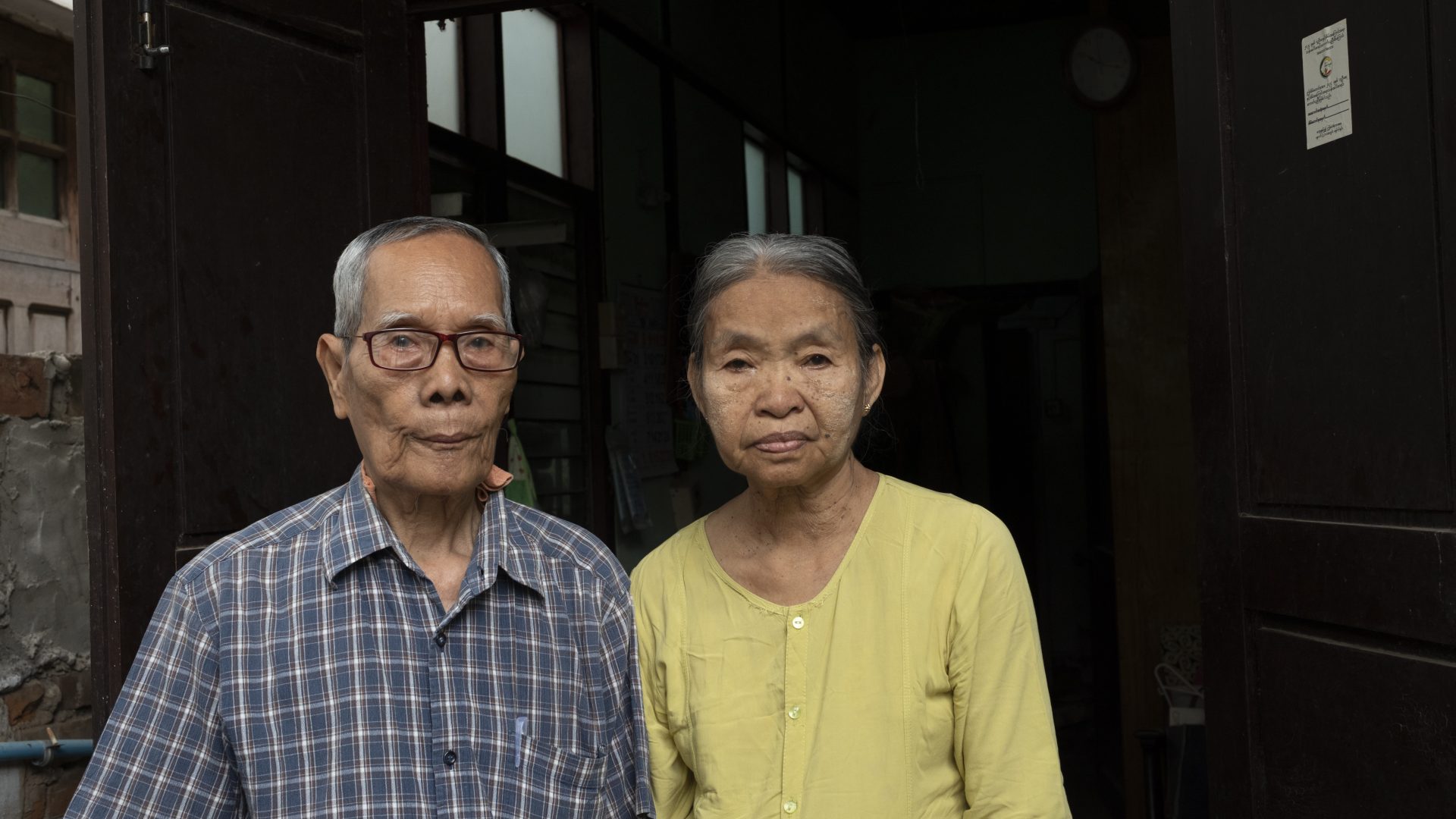A life uprooted: “We live just the two of us”
Before the earthquake, Daw Than Than Swe and U Aung Kyaing lived a quiet life on their own in Mandalay. Retired from the army and the government respectively, they lived on a small pension, just the two of them in a modest home.
That life changed in an instant. When the quake struck, their sons insisted they move into his family home for safety. “Our sons came and took us,” Daw Than Than Swe explained. “They said it’s dangerous – what if bricks and other stuff fell? Our building is small.”
Now displaced, they share space with their son and daughter-in-law, sleeping outside most nights because the neighbouring buildings are cracked and unsafe. “I want to go back to our home, but we can’t,” she says. “Not with this situation. The building behind our house is tilted.”
The toll of fear: “I can’t sleep at night”
The couple, both in fragile health, are deeply affected by the trauma of the earthquake. “I can’t eat and sleep properly,” U Aung Kyaing says. “I’m stressed. I have never experienced this in my life… I can’t sleep; if I wake up, I get lost in my thoughts.”
For his wife, the stress is equally debilitating. “I have high blood pressure and diabetes. I don’t feel good. I think it’s shaking even if it’s not. And I think my vision is slanted – I see all the houses tilted.”
Their mental and physical health is deteriorating. A squat toilet in their temporary shelter adds to the discomfort, as Daw Than Than Swe struggles with knee pain. “A sitting toilet is better.” she says.
Abandoned in the aftermath: “We haven’t received anything yet”
Despite the scale of the disaster, the couple say they have not received any assistance. “We haven’t received anything yet,” U Aung Kyaing says.
While food donations from the local community help them get by, they are reliant on their sons for survival. “We eat what my elder son feeds us,” they say. “There’s a food donation in the morning here, so we eat breakfast there, and my son feeds us dinner.”
But for older people with no family or fewer resources, such support is not guaranteed.
Living in fear: “We’re worried for our lives”
Fear continues to define their daily lives. “We are worried about our lives,” says U Aung Kyaing. “We can’t run away if the earthquake hits us at night, because of our age. We will die.”
Their own home remains locked, damaged beyond safety. “Everything had holes and cracks. We didn’t care if thieves and looters took our stuff. We just locked the outside and left it,” he says.
They want to return. But they also want to survive. “We sleep outside. My son’s house is also not suitable. The building on the side has cracks, and the one at the back is cracked too,” he adds.
A plea for dignity: “We just want everything back to normal”
Their wish is simple and heartbreakingly clear. “I want all the damages to be fixed,” U Aung Kyaing says. “I want it back to normal. If we can stay back at home, life will be back to normal. We can donate to the monks like we used to before.”
For Daw Than Than Swe, the loss is personal and deeply felt. “After everything, my water tank broke, and the kitchen was flooded… my plates, my clothes are all damaged by the water. I can’t do anything yet. I’m scared. The building is tilted. I’m afraid of being crushed trying to clean up the apartment.”
Left behind: older people’s rights in crisis
This is not just a story of a couple struggling after an earthquake. It is a story of how older people are left behind in crisis responses. Despite their vulnerability, their needs – shelter, healthcare, accessible toilets, emotional support – are often overlooked.
In their final words, Daw Than Than Swe and U Aung Kyaing offer not anger, but a quiet plea: “We don’t have anyone else to rely on… I would like to ask for your help with whatever you can help us.”
In the wreckage of a disaster, older people like them should not have to fight to be seen. Their lives, their dignity, and their rights matter, now more than ever.

